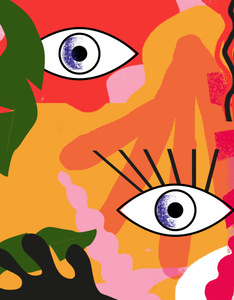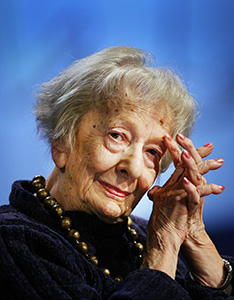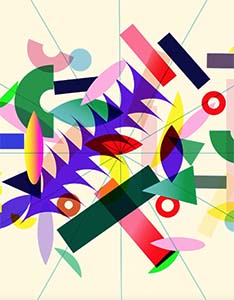“Radical Hope” – works from the collection of Galeria Arsenał in Białystok presented at the Golden Thread Gallery in Belfast
On 13 September 2025, the Golden Thread Gallery in Belfast will open the exhibition “Radical Hope”, featuring works by Hubert Czerepok, Zhanna Kadyrova, Diana Lelonek, Lada Nakonechna, Marina Naprushkina, Konrad Smoleński, and Piotr Uklański. All the works are part of Collection II of Galeria Arsenał in Białystok – one of the most significant contemporary art collections in Poland. “Radical Hope” explores whether art can serve as a guide in uncertain times.
The exhibition is part of the ongoing UK/Poland Season 2025, co-organised by the Adam Mickiewicz Institute, the British Council and the Polish Cultural Institute in London, with the support of the Ministry of Culture and National Heritage and the Ministry of Foreign Affairs of the Republic of Poland.
“Radical Hope” – works from Collection II of Galeria Arsenał in Białystok for the first time at the Golden Thread Gallery
In cooperation with Galeria Arsenał in Białystok and the Adam Mickiewicz Institute, the Golden Thread Gallery presents the exhibition “Radical Hope”, featuring works from one of the most important contemporary art collections in Poland. “Collection II”, owned by Galeria Arsenał and curated by Monika Szewczyk, traces the evolution of contemporary art in Poland and Eastern Europe over the last three decades. Based on the concept of an open collection, it functions as a living archive: dynamic, evolving, and responsive to the changing narratives of our times.
“Radical Hope”, curated by Monika Szewczyk, reflects on uncertainty, resilience, and the transformative potential of art. The title of the exhibition was inspired by Jonathan Lear’s book of the same title. Following the line of thought outlined by Lear, the exhibition invites viewers to embrace a new understanding of hope that goes beyond mere expectations of improvement or problem-solving. Escaping an existential impasse, Lear suggests, is only possible with the guidance of someone who can perceive new meaning and possibilities.
The exhibition “Radical Hope” holds a special place in our UK/Poland Season 2025 programme, which features a number of outstanding exhibition projects. The collection of Galeria Arsenał in Białystok, presented at the Golden Thread Gallery, is unique in that it includes works by Polish, Ukrainian and Belarusian artists. This demonstrates our commitment to creating a platform for those who have found a welcoming home and a safe space to create in Poland. Today, there is no escaping the reality that we live in times of growing conflict and threats, but our response need not be one of helplessness. “Radical Hope” challenges us to seek solutions, to build community, and ultimately, to undergo an inner transformation. Art and culture prove to be a compass, helping us discover new directions for understanding and perspectives that restore our hope – says Olga Brzezińska, Deputy Director of the Adam Mickiewicz Institute.
Polish, Ukrainian, and Belarusian contemporary artists in Belfast
Hubert Czerepok, Zhanna Kadyrova, Diana Lelonek, Lada Nakonechna, Marina Naprushkina, Konrad Smoleński, and Piotr Uklański are the artists whose works comprise the exhibition “Radical Hope”. Through their work, the exhibition presents key developments in Polish, Ukrainian, and Belarusian contemporary art, reflecting the cultural transformations that have taken place since the period of systemic change. The artists’ works also address some of the most pressing and shocking events faced by the international community in recent years, including the war in Ukraine, the frozen protests in Belarus, and the demonstrations on the streets of Tbilisi.
Hubert Czerepok (Poland) is a visual artist and creator of installations, photographs, objects, and films. He studied at the Academy of Fine Arts in Poznań, graduating in 1999 from the studios of Izabella Gustowska and Jan Berdyszak. He is currently an Associate Professor at the Faculty of Painting and New Media at the Academy of Art in Szczecin, where he also heads the Experimental Film Studio. Czerepok explores anomalies and the strange or uncontrollable, analysing the structures that shape human behaviour. He investigates conspiracy theories and paranormal phenomena, mixes history with utopia, and searches for the rules of the so-called Great Conspiracy.
Zhanna Kadyrova (Ukraine) works across multiple media, including video, installation, performance, painting, drawing and sculpture. Cities are often the focus of her practice. Kadyrova brings overlooked elements of public space back into attention, redefining their function and highlighting how architecture shapes the way we move through urban environments.
Lada Nakonechna (Ukraine) is an artist and researcher who has been active in various artistic, curatorial, and publishing groups since 2005. In 2015, she co-founded Method Fund, an independent non-profit organisation dedicated to supporting and developing contemporary art and culture in Ukraine through research, education, and exhibition projects. Nakonechna works with drawing, public-space interventions, and creates installations, films, and performances, using artistic means to examine reality in relation to current political and social issues.
Diana Lelonek (Poland) is a visual artist whose practice combines photography, installation, and bioart. She obtained her PhD through the Interdisciplinary Doctoral Studies at the University of Arts in Poznań and has received the Vordemberge-Gildewart Foundation Art Prize as well as Polityka’s Passports 2018 award. Lelonek’s work investigates the most pressing and visible changes in the biosphere, exploring new modes of coexistence between humans and non-humans. Her practice moves beyond the Anthropocene, envisioning interspecies and egalitarian cohabitation.
Marina Naprushkina (Belarus) works in installation, text, drawing and performance. Her politically engaged practice critically examines state power and emphasises collective self-organisation. She is the founder of the Anti-Propaganda Office and co-founder of “Neue Nachbarschaft/Moabit”, a migrant-run space for socio-cultural exchange. Naprushkina treats art as a tool for political change, placing solidarity, care, and resistance at the heart of her work.
Konrad Smoleński (Poland) is a multimedia artist and graduate of the University of Arts in Poznań. He creates installations that combine sound, video, and performance, where the energy of punk rock meets minimalist aesthetics. Often based on live sound manipulation, his works explore the boundaries between rock music and contemporary art. Smoleński has been awarded the Deutsche Bank Foundation’s Spojrzenia Prize (2011) and represented Poland at the 55th Venice Biennale (2013).
Piotr Uklański (Poland) works in photography, installation, video, and performance. He plays an ironic and critical game with the seductive allure of popular culture and visual clichés, revealing their undeniable charm. Uklański finds beauty in the banal and familiar, in forgotten spaces, or in moments when it appears unexpectedly. He engages the audience in immersive situations designed to evoke nostalgia, sentimentality, and a sense of delight.
UK/Poland Season 2025
UK/Poland Season 2025 is a cultural programme of unprecedented scale, featuring several dozen events across multiple cities in both Poland and the UK. Running until November 2025, the season marks a new chapter in bilateral cooperation, revitalising cultural dialogue and strengthening existing ties between the two countries. For residents of both countries, it offers a unique opportunity to explore the most exciting artistic phenomena from both sides – encompassing film, theatre, visual arts, design, and music. In Poland, the events are organised by the British Council, while in the UK – by the Adam Mickiewicz Institute, the Polish Cultural Institute, and the British Council. The organisation of the Season in the UK and Northern Ireland is supported by the Ministry of Culture and National Heritage, as well as the Ministry of Foreign Affairs in Poland.
Other exhibition projects as part of the UK/Poland Season 2025:
-
2 October 2025 – opening of an exhibition of Polish photography at the Belfast Exposed Gallery, as part of the Belfast International Arts Festival.
-
9 October 2025 – opening of the exhibition “Zofia Rydet: Sociological Record” at the Photographers’ Gallery London.
-
31 October – 28 November 2025 – exhibition “Planetary Consciousness. Ecosystems of Care” at the Modal Gallery, School of Digital Arts, Manchester.
The Adam Mickiewicz Institute (AMI) brings Polish culture to people around the world. Being a state institution, it creates lasting interest in Polish culture and art through strengthening the presence of Polish artists on the global stage. It initiates innovative projects, supports international cooperation and cultural exchanges. It promotes the work of both established and promising artists, showing the diversity and richness of our culture. The Adam Mickiewicz Institute is also responsible for the Culture.pl website, a comprehensive source of knowledge about Polish culture. More information: www.iam.pl.
The Polish Cultural Institute in London promotes Polish culture and heritage in the UK, fostering cooperation with cultural and academic institutions in both countries. Through relationship-building, resource-sharing, and financial support, it effectively showcases the best examples of Polish art, film, theatre, music, literature, science, and national heritage to British audiences.
The British Council represents the United Kingdom of Great Britain and Northern Ireland in the field of cultural and educational cooperation. It promotes peace and prosperity by fostering connections, understanding, and trust between people in the UK and countries worldwide. Active in culture, art, education, and English language teaching, the British Council operates in over 200 countries and territories, with a presence in more than 100 of them. In 2022-2023, it reached 600 million people.


